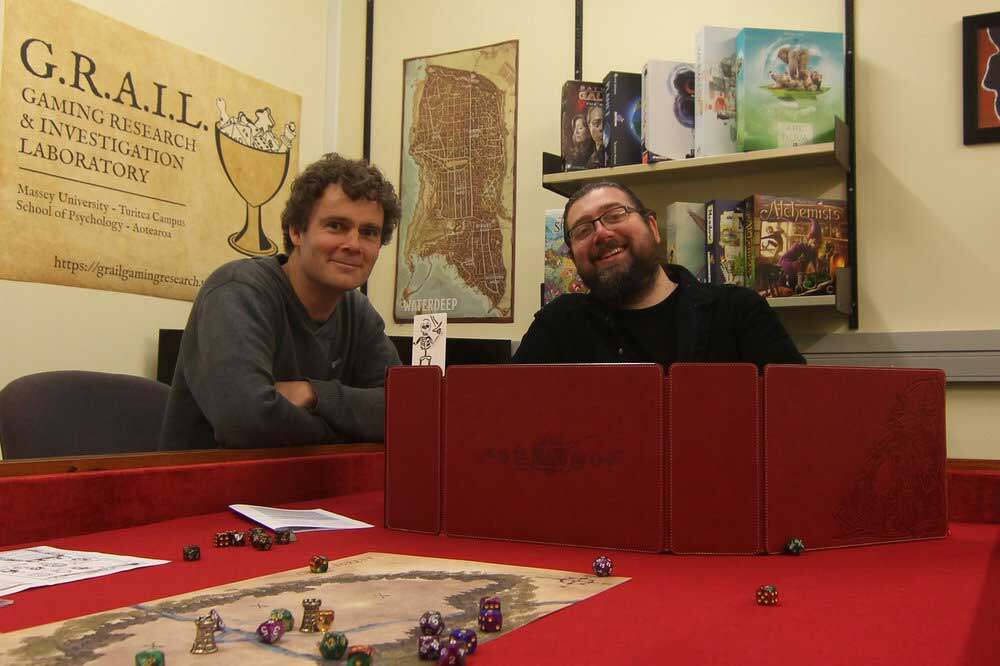The lab will investigate the potential positive effects of gaming with a focus on two key areas: tabletop roleplaying games (TTRPGs) and boardgames.


TTRPG research will be managed by Mr Garea and boardgames by Mr Hebden. The Gaming Research and Investigation Laboratory (GRAIL) will also investigate how different games interact and what effects this interaction may have on players.
“We picked GRAIL as a name because it speaks to questing, which works both for gaming and adventuring but also the quest for knowledge and research,” Mr Garea says.
The lab will also aim to become a hub for students interested in psychology and gaming to come and play in-person, socialise, learn, experiment and build ideas for future research.
“Play allows us to experiment, to try new things, to succeed or to fail with no major repercussions. Games allow us to grow and to learn. So, just what kind of things are there that we can learn from the games that people already love to play? Imagine being prescribed some Dungeons & Dragons twice monthly for half a year, or remembering to take your weekly dose of Gloomhaven or Wingspan? I am slightly joking of course but think about the potential,” he says.
“Games get us all around the table talking, thinking and interacting which, from a research perspective, is a great foundation to build upon. Modern games are like any other creative piece of work, they can be a voice for communities or provide an opportunity to reflect on important topics and themes,” Mr Hebden says.
More gaming, psychology and GRAIL
During and since the COVID-19 pandemic, in-person tabletop roleplaying games have risen in the public consciousness and popularity, thanks in large part to shows like Stranger Things, The Big Bang Theory and online ‘let’s play’ channels like Critical Role and Dimension 20.
One arm of GRAIL, run by Mr Garea, will investigate the potential psychological, educational and therapeutic benefits of playing and engaging in creative roleplay as this gaming trend continues to grow.
“We already see roleplay used in education and in workplaces to train skills, but people love to roleplay for fun too. So, when people do this for fun are there any benefits that are going on that we just don’t seem to be paying attention to? Benefits to areas such as socialisation, gender confidence, representation, cooperation, knowledge sharing, learning, empathy, problem solving etc?”
“A large section of the LGBTQ+ community for instance has embraced TTRPGs over the last several years. The ability to be someone else, to try on a new skin, or to experiment with sexuality, gender and identity in a fun welcoming environment has provided many players with a much-needed refuge.
“Additionally, roleplaying games written by first-nation peoples in the United States provide a rich cultural experience for those who identify with their culture and also for those who wish to learn more about it. Games can open-up horizons,” Mr Garea explains.
It seems that games, especially ‘theatre of the mind’ ones (which TTRPGs are often described as), can set a stage where imagination, learning and play converge and, because of the flexible nature of these games, they can be tailored to group experiences and the interests and strengths of the players involved.
TTRPGs are sessions of collaborative storytelling that help players explore themes or ideas at a pace that suits them, providing both entertainment and feelings of genuine agency. Any potential psychological benefits may be occurring as a bonus to just having fun.
Boardgames have been around for thousands of years and over the last few decades a kind of renaissance has occurred in this area – likely to be heavily influenced by COVID-19, where people often were hungry for more in-person activities and to play and engage in physical collective tasks/games.
“In 2023, adult-oriented games featuring rich experiences beyond the typical family staples of Monopoly or Snakes and Ladders abound; games where you explore fantasy worlds, stop a pandemic, have a romance, or build a spaceship,” Mr Garea says.
This arm of GRAIL, run by Mr Hebden, will look at similar areas to TTRPGs with a focus on socialisation, teaching, meaning making and learning through play.
Boardgames differ from TTRPGs as they drill down on particulars such as economics, social deduction and negotiation. Through the more structured design of boardgames, GRAIL can focus on many of the same topics of interest, such as cooperation, empathy, sociality and focused learning, but with a more targeted approach.
So, boardgames might be able to help players learn in ways that do not feel like learning, while also providing a welcoming friendly structure that does not overwhelm a player with too much freedom of choice.
GRAIL public launch at Armageddon
Mr Garea and Mr Hebden will also be launching the lab to the public at the upcoming Armageddon Expo on 5-6 August in Palmerston North. They will be running free sessions of games for attendees to come, sit, play and think a little bit about psychology all the while.
Mr Shaun Garea has published in areas of gaming related to cognition, cooperation, aggression and gambling. He’s also worked for years in film and the arts, garnering experience in both writing and directing which may explain his love of narrative storytelling and roleplay, and their potential for psychological benefit.
Mr Hebden has published in the areas of social media, marketing and drinking culture. He is very interested in boardgames (as his large collection attests), with special interest in games as cultural artefacts and tools of modern meaning making.
Visit the GRAIL website for more information.






































